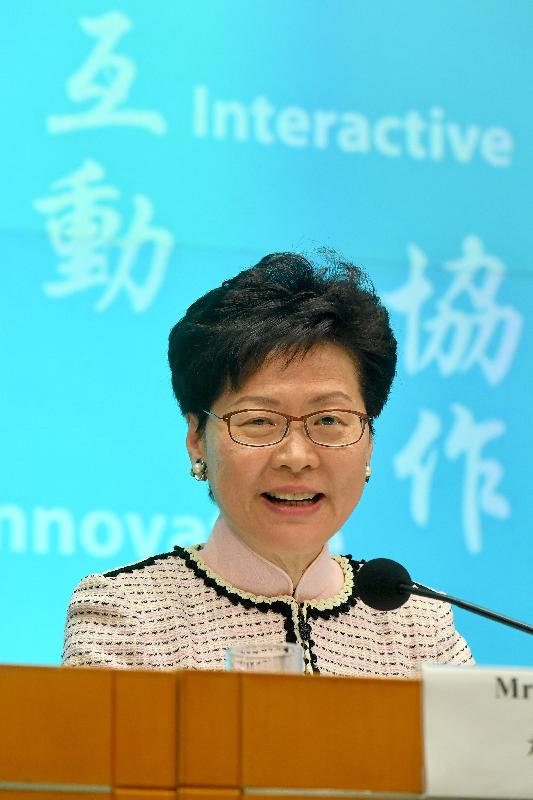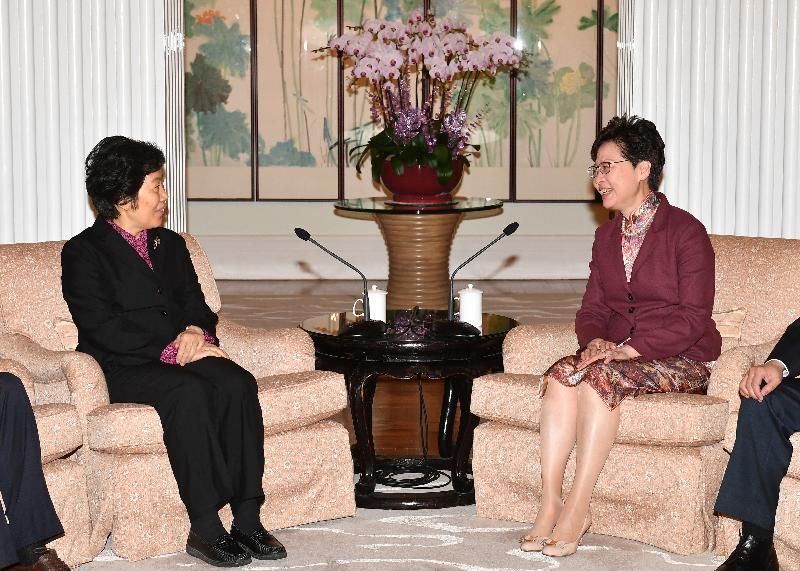The Centre for Health Protection (CHP) of the Department of Health (DH) is today (March 26) investigating five additional cases of measles infection of which three involved workers at the Hong Kong International Airport (HKIA). The CHP reminded the public again that vaccination is the most effective way to prevent measles.
​ As at 4pm today, three cases affecting workers of the HKIA which involved two females and one male were recorded. The first case involves a 41-year-old woman with good past health, who developed rash on March 21. She consulted private doctors on March 22 and 23. She sought medical advice at Princess Margaret Hospital (PMH) on March 23 and was admitted for treatment. Her respiratory specimen tested positive for measles virus upon laboratory testing. She is in a stable condition. The patient’s measles vaccination history is unknown. She had no travel history during the incubation period or communicable period.
​ The second case involves a 25-year-old woman with good past health, who developed cough on March 21 and rash on March 23. She consulted a private doctor on March 23. She sought medical attention at Hong Kong Baptist Hospital on the following day and was transferred to PMH for admission and treatment. Her respiratory specimen tested positive for measles virus upon laboratory testing. She is in a stable condition. She reported to have measles vaccination and had no travel history during the incubation period or communicable period.
​ The third case involves a 23-year-old man with good past health, who developed fever on March 20 and rash on March 22. He attended North Lantau Hospital on March 23 and was transferred to PMH for admission and treatment on the same day. His respiratory specimen tested positive for measles virus upon laboratory testing. He is in a stable condition. He reported to have measles vaccination. He travelled to Macao and Zhuhai during the incubation period but had no travel history during the communicable period.
The Controller of the CHP, Dr Wong Ka-hing, at a press conference today said, “Since an outbreak emerged at the airport last week, the CHP has attached great importance to the infection control measures at the airport, in particular the measles vaccination for people working at the airport who are non-immune to measles. The CHP has been closely monitoring and improving the operation and arrangements of the measles vaccination stations at the airport. To facilitate people who need the vaccination, the DH has deployed extra manpower to provide an additional time slot starting today. It is expected that the service capacity can be increased from 700 to 1 300 vaccinations daily.”
​ The measles vaccination exercise at the airport aims to protect those working at the airport who are non-immune to measles. The target group refers to people working at the airport who are:
(1) Non locally-born or those born in Hong Kong from 1967 to 1984; and
(2) Have not received two doses of measles vaccination; and
(3) Have not been infected with measles before.
​ From today to March 29, the arrangements of the vaccination stations at the airport are as follows:
| Venue: |
Port Health Office Health Post (South Arrival Apron Passenger Vehicle Lounge, Level 4, Terminal 1) |
| Multi-function Room, HKIA Tower (Level 5, Terminal 2) |
| Hours: |
10am to 1pm |
| 2pm to 5pm |
| 6pm to 9pm (New time slot) |
​ Dr Wong said, “The CHP will closely monitor and review the vaccination progress for people working at the airport. We will continue to closely liaise with the Airport Authority to explore ways to further enhance the vaccination arrangements. Arrangements after March 29 will be announced in due course.”
​ Around 787 persons received measles vaccination at the vaccination station as at 5pm today, bringing the cumulative number of vaccinations given to 1 655. A hotline (2125 1122) is set up for public enquiries and operates from 9am to 5.45pm daily. As of 5pm today, the hotline received a total of 1 024 enquiries.
Dr Wong said, “On the supply of measles vaccines in Hong Kong, the DH has maintained close liaison with the vaccine suppliers to strive for a steady supply for the Hong Kong Childhood Immunisation Programme and the vaccination exercise at the airport. We learnt that the vaccine suppliers will import extra quantities of measles vaccines as soon as possible and we will continue to communicate with the suppliers with a view to addressing the local demand.”
Separately, the CHP is investigating two other cases of measles infection. The fourth case affected a 43-year-old woman, with good past health, who developed fever on March 13 and rash on March 17. She attended a Chinese medicine clinic on March 13. She sought medical attention at Tin Shui Wai Hospital on March 13, 16 and 18 and was transferred to Pok Oi Hospital for admission and treatment on March 18. Her respiratory specimen tested positive for measles virus upon laboratory testing. She is in a stable condition. Her measles vaccination history is unknown. She travelled to Shenzhen during the incubation period but had no travel history during the communicable period.
The fifth case involves a 39-year-old man with good past health. He developed fever on March 17 and rash on March 22. He sought medical advice at a school clinic on March 22 and 23 and was referred to the Queen Elizabeth Hospital on March 23 where he was admitted for management. His respiratory specimen tested positive for measles virus upon laboratory testing. He is in a stable condition. The patient reported to have received measles vaccination. He had no travel history during the incubation period or communicable period.
​ According to the patients, all of them did not have contact with measles patients during the incubation period. Their home contacts have remained asymptomatic so far and have been put under medical surveillance.
​ Upon notification of the cases, the CHP immediately commenced epidemiological investigations and conducted relevant contact tracing. Initial investigations revealed that no contact has shown measles-related symptoms so far. No high risks contacts such as immunocompromised persons, young children aged below one and pregnant women are identified among the contacts. The public places the patients visited during the communicable period are listed in the appendix.
​ Information of the confirmed measles cases in 2019 with their case summary is uploaded onto the
CHP website.
​ Separately, the CHP was notified by the Centers for Disease Control and Prevention of the United States (US) of two measles cases confirmed in the US in which the patients took flights involving Hong Kong. The CHP’s contact tracing is ongoing. The flights taken by the two patients are listed in the appendix.
​ A spokesman for the CHP explained, “Measles is a highly infectious disease caused by the measles virus. It can be transmitted by airborne droplets spread or direct contact with nasal or throat secretions of infected persons, and, less commonly, by articles soiled with nose and throat secretions. A patient can pass the disease to other persons from four days before to four days after the appearance of skin rash.”
​ The spokesman reminded, “The incubation period of measles ranges from seven days to up to 21 days. Contacts who are not immune to measles may develop relevant symptoms, such as fever, skin rash, cough, runny nose and red eyes, in the incubation period. They should observe if they develop such symptoms in the period. If symptoms arise, they should wear surgical masks, stop going to work or school and avoid going to crowded places. They should avoid contact with non-immune persons, especially persons with weakened immunity, pregnant women and children aged below one. They should also report their symptoms and prior travel history to the healthcare workers so that appropriate infection control measures can be implemented at the healthcare facilities to prevent any potential spread.”
​ “Vaccination is the most effective way to prevent measles. Members of the public who are planning to travel to places with high incidence or outbreaks of measles should review their vaccination history and past medical history, especially people born outside Hong Kong who might not have received measles vaccination during childhood. The history of measles vaccination in Hong Kong is available in the CHP’s
measles thematic page. Those who have not received two doses of measles-containing vaccines, with unknown vaccination history or with unknown immunity against measles are urged to consult their doctor for advice on vaccination at least two weeks before departure,” the spokesman said.
​ Besides being vaccinated against measles, members of the public should take the following measures to prevent infection:
• Maintain good personal and environmental hygiene;
• Maintain good indoor ventilation;
• Keep hands clean and wash hands properly;
• Wash hands when they are dirtied by respiratory secretions, such as after sneezing;
• Cover the nose and mouth while sneezing or coughing and dispose of nasal and mouth discharge properly;
• Clean used toys and furniture properly; and
• Persons with measles should be kept out of school till four days from the appearance of rash to prevent spread of the infection to non-immune persons in school.
For more information on measles, please visit the CHP’s
measles thematic page. For outbreak news of measles outside Hong Kong or the latest travel health advice, please visit the website of DH’s
Travel Health Service.
read more




